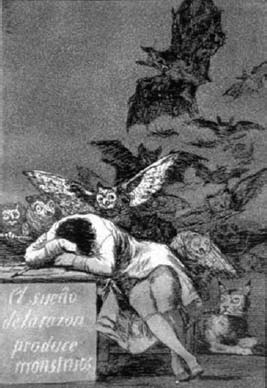Baroque and Beyond C. 1600–1850Romanticism |
Who was Francisco Goya? |
Francisco Goya y Lucientes (1746–1828) was a Spanish Romantic painter who lived to see Napoleon Bonaparte absorb Spain into his Empire, a violent massacre of the people by the new government, the restoration of the Spanish monarchy, and the reinstitution of the Spanish Inquisition. Goya, who at one time was the court painter for Spanish king Charles IV (and painted a perhaps too realistic, arguably unflattering portrait of the royal family in 1800), was inspired by the Enlightenment ideas of the French Revolution and deeply disappointed by the failure of those ideas to instill fundamental change in Spain. Charles IV cracked down hard on social change, even banning the entry of books into the country. Goya’s series of eighty etchings, Los Caprichos (The Caprices), completed between 1796 and 1798, respond to what Goya perceived of as the folly of the Spanish people at the time.
The Sleep of Reason Produces Monsters, an aquatint etching from this series, depicts Reason personified as a slouched, sleeping figure. While Reason is preoccupied by slumber, ominous creatures emerge from the darkness, including owls, bats, and a cat with wide, glowing eyes. Goya’s work suggests the genius of Velazquez, the satire of Hogarth, and the refinement of Reynolds, while illustrating a highly individual and complex imagination steeped in Spanish mysticism and superstition. Other important paintings by Goya include Third of May, 1808 (1814–1815), which commemorates the massacre of Spanish prisoners by the French, dark paintings such as Saturn Devouring one of his Children (1820–1823), and many portraits.

Spanish artist Francisco Goya y Lucientes created a series of eighty etchings focused on the theme of human folly. The Sleep of Reason Produces Monsters (c. 1799) is an aquatint etching from that series.
